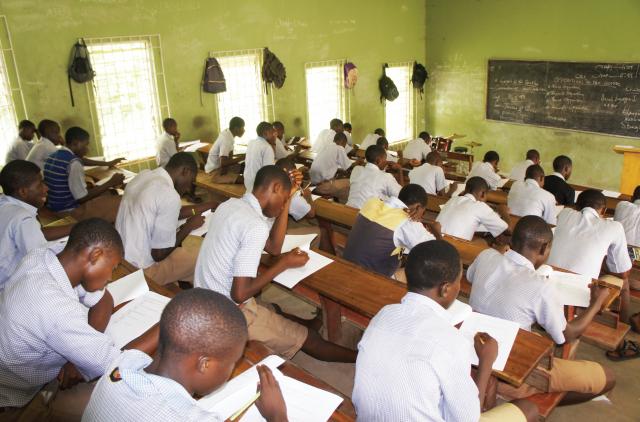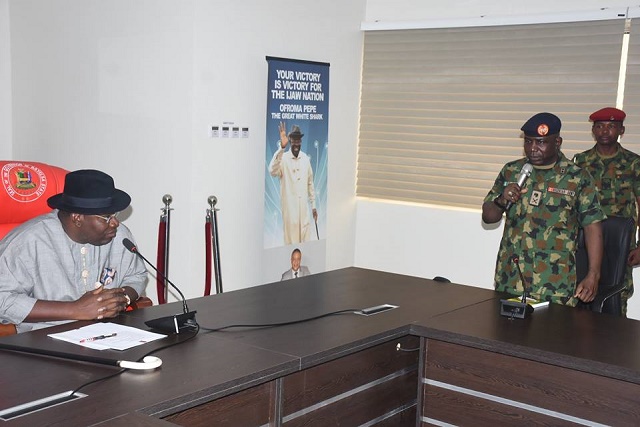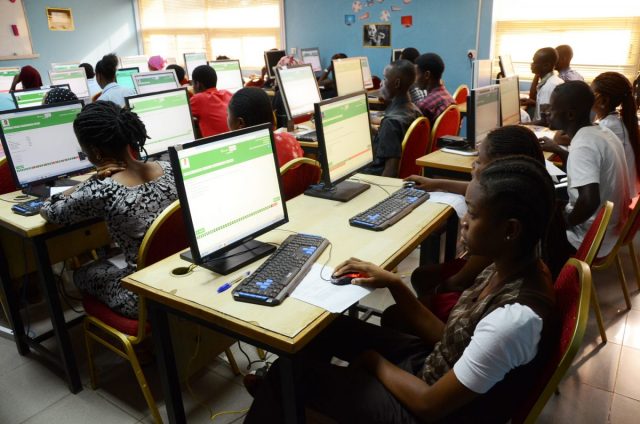PRESIDENT BUHARI RECEIVED SUPREME JUSTICE 1A&B. R; President Muhammadu Buhari Exchanges greetings with by the Chief of Justice of Nigeria, CJN, Hon Justice Walter S. N. Onnoghen during a Courtesy Visit by the Justice of the Supreme Court held at the Council Chamber State House in Abuja. PHOTO; SUNDAY AGHAEZE/STATE HOUSE IN ABUJA. OCT 6TH 2017
If President Muhammadu Buhari goes by the recommendation of the National Judicial Council (NJC), Walter Onnoghen, the chief justice of Nigeria (CJN) could get retirement benefits in cash and kind up to N2.5 billion, checks by TheCable have revealed.
As part of the package for a retired chief justice, a house will be built for him in Abuja with a nine-digit sum for furnishing — in addition to a severance gratuity that is 300% of his annual basic salary of N3,363,972.50, as well as pension for life.
Just like state governors, a retired chief justice is entitled to a number of domestic staff and sundry allowances for personal upkeep.
This package for judicial officers was put together by the NJC long before Onnoghen became the CJN in 2017.
Advertisement
However, if he is dismissed, he will not be entitled to any benefits.
The president still needs the confirmation of two-thirds of the senate to dismiss or retire him.
Section 292 (1) of the 1999 constitution says a “judicial officer shall not be removed from his office or appointment before his age of retirement except in the following circumstances – (a) in the case of – (i) Chief Justice of Nigeria… by the President acting on an address supported by two-thirds majority of the Senate.”
Advertisement
TOUGH CALL
TheCable reported on Wednesday that the NJC has recommended the embattled CJN for compulsory retirement after deliberating on a petition by the Economic and Financial Crimes Commission (EFCC) which alleges “financial impropriety, infidelity to the constitution and other economic and financial crimes related laws”.
Onnoghen, who denies all allegations, is also undergoing trial at the Code of Conduct Tribunal (CCT) over charges of false asset declaration.
TheCable understands that members of the NJC were not convinced by his defence but also decided that he should be offered a “soft landing” through retirement.
Advertisement
This option may also include withdrawing criminal charges against him.
“The major problem Onnoghen’s defence had was that even though he claimed those funds found in his accounts were his, he could not provide evidence on how he made the money,” a source in the know of the deliberations told TheCable.
“He provided evidence of source of income from one investment but that went nowhere near the $200,000 per annum deposits in his account. Unfortunately, there is a supreme court judgement that says where your assets exceed your income, the burden of proof is on you, not on the prosecution.
“It also did not help Onnoghen that he never touched his salary account for so many years. He said he was living off the proceeds from his farms, but he did not provide a single proof to back this up.
Advertisement
“Also, money paid into his account by senior lawyers is completely unethical. You can say they do not amount to much, but you cannot justify such impunity. It was a very difficult case to make.”
NO EASY ROAD TO SOFT LANDING
Advertisement
Presidency sources, however, told TheCable that the option of “soft landing” will be difficult to justify “given the anti-corruption efforts of President Buhari”.
TheCable learnt that before the scandal blew into the open, Onnoghen was given the option of early voluntary retirement.
Advertisement
“Under this arrangement, he would have kept all the monies found in his accounts and received all his benefits from the system, but he chose to fight till the very end,” the source said.
“The implication now is that the criminal charges may go on, his assets will be frozen and will most likely be forfeited to the federal government after his trial and he will be banned from holding public office for at least 10 years.”
Advertisement
Onnoghen has closed his defence at the CCT and the tribunal is expected to give its judgment at the next sitting on April 15.
But for the crisis, Onnoghen, who is 68, was due for retirement in 2020.
Add a comment






